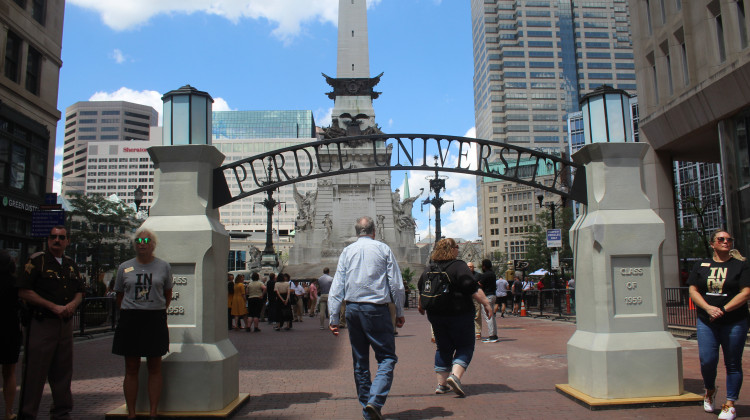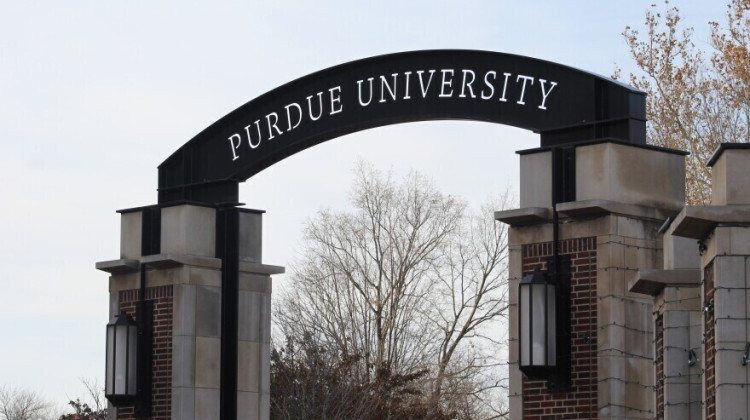
Purdue University staged the launch of its Indianapolis campus in Monument Circle in June 2024.
Ben Thorp / WFYIA federal judge ruled Thursday that he would not grant a temporary restraining order to seven international students whose visas the U.S. Department of Homeland Security revoked earlier this month.
The students requested that the court reinstate their visas and block immigration authorities from detaining or deporting them, arguing that the federal government’s actions violated their Fifth Amendment due process rights.
Judge James Patrick Hanlon of the Southern District of Indiana said in an order that the students at Purdue, IU Indianapolis, and Notre Dame universities have not shown how their visa loss would result in serious consequences.
“While the court understands the turmoil that Plaintiffs are experiencing because of the sudden and unexpected termination of their F-1 student status in SEVIS, Plaintiffs have not demonstrated irreparable harm to warrant the extraordinary exercise of judicial power required for the Court to issue a temporary restraining order,” Hanlon wrote.
The Student and Exchange Visitor Information System, or SEVIS, is a federal program used to track and manage F-1 visa recipients.
The federal government has recently changed the visa status for over 1,550 international students at more than 240 schools.
Federal judges in other states — including Alabama, Arizona, California, Massachusetts, Minnesota, New Hampshire, New York, and Wisconsin — have granted similar temporary restraining orders to international students who lost their visas and filed lawsuits, according to court records.
In the Indiana lawsuit, students at the universities argue their visas were cancelled without notice or a chance to respond and now live in fear of deportation. The visas allow them to study at U.S. universities and obtain employment so long as they uphold certain requirements.
Five of the students are enrolled in programs at Purdue University and one at Indiana University Indianapolis. They each have Chinese citizenship. The seventh student attends University of Notre Dame and is from Nigeria.
The ACLU of Indiana represents the students. Legal director Ken Falk said in a statement that they were “obviously deeply disappointed in this decision.”
The judge said more evidence is needed.
“Under Supreme Court precedent, ‘some possibility’ of deportation is not enough to show irreparable harm…Plaintiffs have not shown non-speculative harm beyond a potential gap in their educations, which standing alone is generally not irreparable harm,” Hanlon wrote.
Each plaintiff must separately demonstrate how they will be harmed by April 25.
Hanlon also noted that only one student resides within the court’s district. The other students may join the lawsuit if they are able to show why they should also be parties to the case by April 23.
Tuesday, Andre Watson, a senior official with the National Security Division for Homeland Security Investigations at DHS, filed a statement in the case in support of the federal government.
DHS ran the students’ information against criminal databases and found “verified” matches to criminal history records, according to Watson. Though the disposition of the charges was “unknown” at the time, the agency still cancelled their SEVIS records.
Watson said none of the students have been detained by ICE and they are not in administrative removal proceedings right now.
In the original complaint, most of the students had some form of legal history. The ACLU argues that previous encounters with law enforcement didn’t violate the conditions of their visas and that, in most cases, the charges were either dismissed or entered into deferral programs.
All seven students are in good standing with their universities, they stated.
“These students have invested years of their lives and thousands of dollars in their education. For DHS to terminate their status with no warning is deeply unfair, and we believe it is illegal,” Falk said.
The ACLU said it’s considering next steps. DHS must respond to the complaint by April 30.
WFYI is reporting on the local impacts of immigration policy. If you want to share your story or have a tip, contact WFYI reporter Zak Cassel at zcassel@wfyi.org.
 DONATE
DONATE






 Support WFYI. We can't do it without you.
Support WFYI. We can't do it without you.